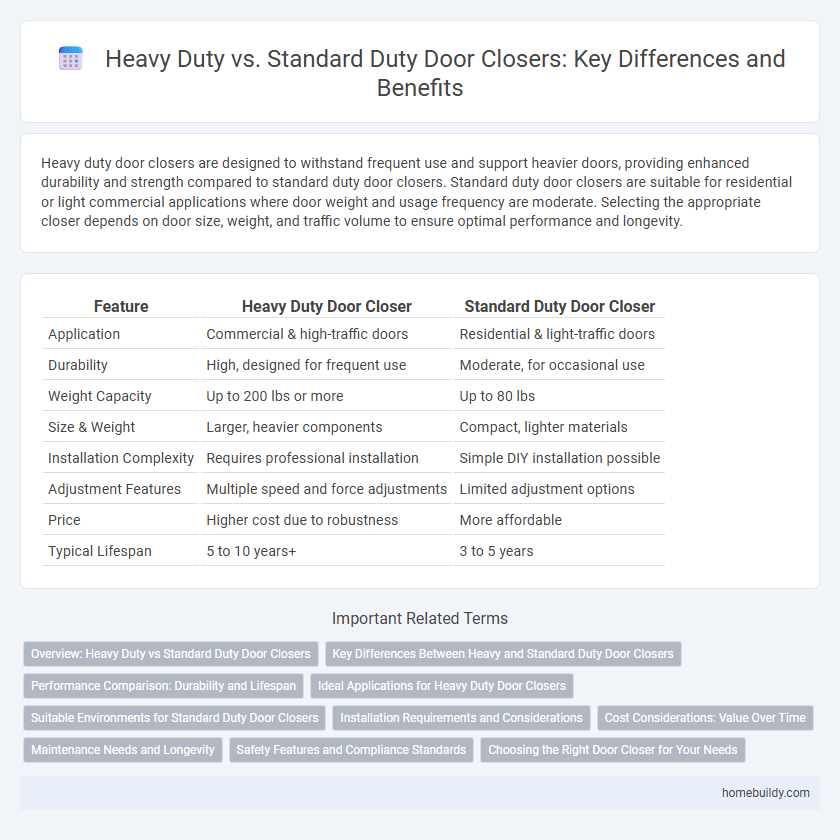Heavy duty door closers are designed to withstand frequent use and support heavier doors, providing enhanced durability and strength compared to standard duty door closers. Standard duty door closers are suitable for residential or light commercial applications where door weight and usage frequency are moderate. Selecting the appropriate closer depends on door size, weight, and traffic volume to ensure optimal performance and longevity.
Table of Comparison
| Feature | Heavy Duty Door Closer | Standard Duty Door Closer |
|---|---|---|
| Application | Commercial & high-traffic doors | Residential & light-traffic doors |
| Durability | High, designed for frequent use | Moderate, for occasional use |
| Weight Capacity | Up to 200 lbs or more | Up to 80 lbs |
| Size & Weight | Larger, heavier components | Compact, lighter materials |
| Installation Complexity | Requires professional installation | Simple DIY installation possible |
| Adjustment Features | Multiple speed and force adjustments | Limited adjustment options |
| Price | Higher cost due to robustness | More affordable |
| Typical Lifespan | 5 to 10 years+ | 3 to 5 years |
Overview: Heavy Duty vs Standard Duty Door Closers
Heavy duty door closers are designed to handle doors with higher weight and frequent usage, offering enhanced durability and stronger closing force compared to standard duty models. Standard duty door closers are suitable for lighter doors with less traffic, providing adequate control and reliability for residential or low-traffic commercial applications. Choosing between heavy duty and standard duty door closers depends on door size, weight, and frequency of use to ensure optimal performance and safety.
Key Differences Between Heavy and Standard Duty Door Closers
Heavy duty door closers are designed for high-traffic areas and heavy doors, offering enhanced durability and extended lifespan compared to standard duty closers. They typically feature stronger springs, higher torsion resistance, and more robust materials to withstand frequent use and greater force. Standard duty door closers are suited for lighter doors and less frequent use, with lower weight capacities and simpler mechanisms.
Performance Comparison: Durability and Lifespan
Heavy duty door closers are engineered with robust materials and reinforced components, offering superior durability and a significantly longer lifespan compared to standard duty door closers. Their enhanced performance can withstand frequent use and higher door weights, making them ideal for commercial and industrial environments. Standard duty door closers, while sufficient for light traffic and residential use, tend to wear out faster under heavy load conditions, resulting in more frequent maintenance and replacements.
Ideal Applications for Heavy Duty Door Closers
Heavy duty door closers are ideal for commercial buildings, hospitals, schools, and industrial facilities where high traffic and frequent use demand robust durability and superior performance. These closers are designed to handle doors weighing over 150 pounds, providing consistent closing force and enhanced security in demanding environments. Standard duty door closers, by contrast, suit low-traffic residential or office doors with lighter weight requirements.
Suitable Environments for Standard Duty Door Closers
Standard duty door closers are ideal for residential buildings, small offices, and light commercial spaces where door usage frequency is moderate. These door closers efficiently handle interior doors with less frequent opening and closing cycles, ensuring smooth operation and increased durability. Their design supports lighter doors typically found in environments with lower traffic and minimal exposure to harsh conditions.
Installation Requirements and Considerations
Heavy duty door closers require robust mounting surfaces and often need reinforced frames or steel doors to support their higher closing force, ensuring durability and security in high-traffic or commercial settings. Standard duty door closers, designed for lighter doors such as residential or interior office doors, have simpler installation demands and can be mounted on typical door frames without additional reinforcement. Proper alignment, torque adjustment, and compliance with fire and safety standards are critical installation considerations for both types to guarantee optimal performance and longevity.
Cost Considerations: Value Over Time
Heavy duty door closers typically have a higher upfront cost compared to standard duty models due to their robust construction and enhanced durability designed for high-traffic areas. Over time, the reduced maintenance expenses and longer lifespan of heavy duty door closers can offer better value, especially in commercial or industrial settings. Standard duty door closers, while more affordable initially, may require frequent replacements or repairs, increasing overall long-term costs.
Maintenance Needs and Longevity
Heavy duty door closers are designed with robust materials and advanced mechanisms that significantly reduce maintenance frequency compared to standard duty door closers, which may require more regular adjustments and part replacements. The enhanced durability of heavy duty door closers results in longer operational life, making them ideal for high-traffic or commercial applications where consistent performance is critical. In contrast, standard duty door closers are suitable for low-traffic environments but tend to exhibit faster wear, increasing the overall maintenance costs over time.
Safety Features and Compliance Standards
Heavy duty door closers offer enhanced safety features such as adjustable closing force, delayed action for safe passage, and fire-rated certifications that comply with NFPA and ADA standards, ensuring robust protection in high-traffic or commercial environments. Standard duty door closers typically meet basic compliance requirements suitable for residential or low-traffic areas but may lack the advanced control and durability needed for stringent safety regulations. Selecting heavy duty models guarantees adherence to OSHA and building code mandates, providing superior reliability and accident prevention in critical applications.
Choosing the Right Door Closer for Your Needs
Heavy duty door closers provide enhanced durability and are designed to withstand frequent use in high-traffic commercial environments, offering greater strength and longer lifespan compared to standard duty door closers. Standard duty door closers are suitable for residential or low-traffic applications, balancing cost-effectiveness with adequate performance. Selecting the right door closer depends on factors such as door weight, frequency of use, and security requirements to ensure optimal functionality and safety.
heavy duty door closer vs standard duty door closer Infographic

 homebuildy.com
homebuildy.com